Play Pedagogy Australia Essay 2022
VerifiedAdded on 2022/10/11
|9
|2530
|19
Essay
AI Summary
Contribute Materials
Your contribution can guide someone’s learning journey. Share your
documents today.

Running Head: SOCIOLOGY 0
PLAY PEDAGOGY
AUSTRALIA
PLAY PEDAGOGY
AUSTRALIA
Secure Best Marks with AI Grader
Need help grading? Try our AI Grader for instant feedback on your assignments.
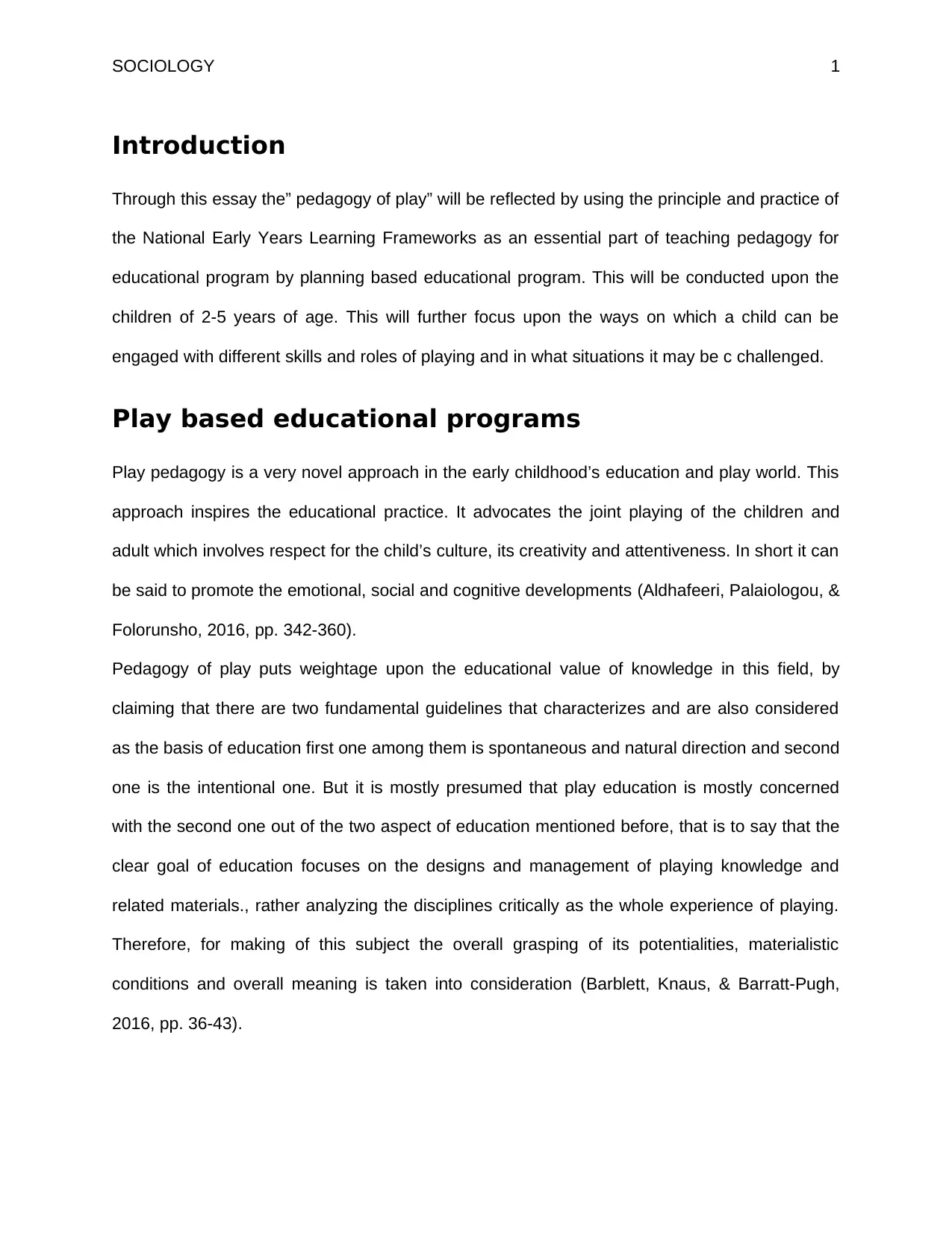
SOCIOLOGY 1
Introduction
Through this essay the” pedagogy of play” will be reflected by using the principle and practice of
the National Early Years Learning Frameworks as an essential part of teaching pedagogy for
educational program by planning based educational program. This will be conducted upon the
children of 2-5 years of age. This will further focus upon the ways on which a child can be
engaged with different skills and roles of playing and in what situations it may be c challenged.
Play based educational programs
Play pedagogy is a very novel approach in the early childhood’s education and play world. This
approach inspires the educational practice. It advocates the joint playing of the children and
adult which involves respect for the child’s culture, its creativity and attentiveness. In short it can
be said to promote the emotional, social and cognitive developments (Aldhafeeri, Palaiologou, &
Folorunsho, 2016, pp. 342-360).
Pedagogy of play puts weightage upon the educational value of knowledge in this field, by
claiming that there are two fundamental guidelines that characterizes and are also considered
as the basis of education first one among them is spontaneous and natural direction and second
one is the intentional one. But it is mostly presumed that play education is mostly concerned
with the second one out of the two aspect of education mentioned before, that is to say that the
clear goal of education focuses on the designs and management of playing knowledge and
related materials., rather analyzing the disciplines critically as the whole experience of playing.
Therefore, for making of this subject the overall grasping of its potentialities, materialistic
conditions and overall meaning is taken into consideration (Barblett, Knaus, & Barratt-Pugh,
2016, pp. 36-43).
Introduction
Through this essay the” pedagogy of play” will be reflected by using the principle and practice of
the National Early Years Learning Frameworks as an essential part of teaching pedagogy for
educational program by planning based educational program. This will be conducted upon the
children of 2-5 years of age. This will further focus upon the ways on which a child can be
engaged with different skills and roles of playing and in what situations it may be c challenged.
Play based educational programs
Play pedagogy is a very novel approach in the early childhood’s education and play world. This
approach inspires the educational practice. It advocates the joint playing of the children and
adult which involves respect for the child’s culture, its creativity and attentiveness. In short it can
be said to promote the emotional, social and cognitive developments (Aldhafeeri, Palaiologou, &
Folorunsho, 2016, pp. 342-360).
Pedagogy of play puts weightage upon the educational value of knowledge in this field, by
claiming that there are two fundamental guidelines that characterizes and are also considered
as the basis of education first one among them is spontaneous and natural direction and second
one is the intentional one. But it is mostly presumed that play education is mostly concerned
with the second one out of the two aspect of education mentioned before, that is to say that the
clear goal of education focuses on the designs and management of playing knowledge and
related materials., rather analyzing the disciplines critically as the whole experience of playing.
Therefore, for making of this subject the overall grasping of its potentialities, materialistic
conditions and overall meaning is taken into consideration (Barblett, Knaus, & Barratt-Pugh,
2016, pp. 36-43).
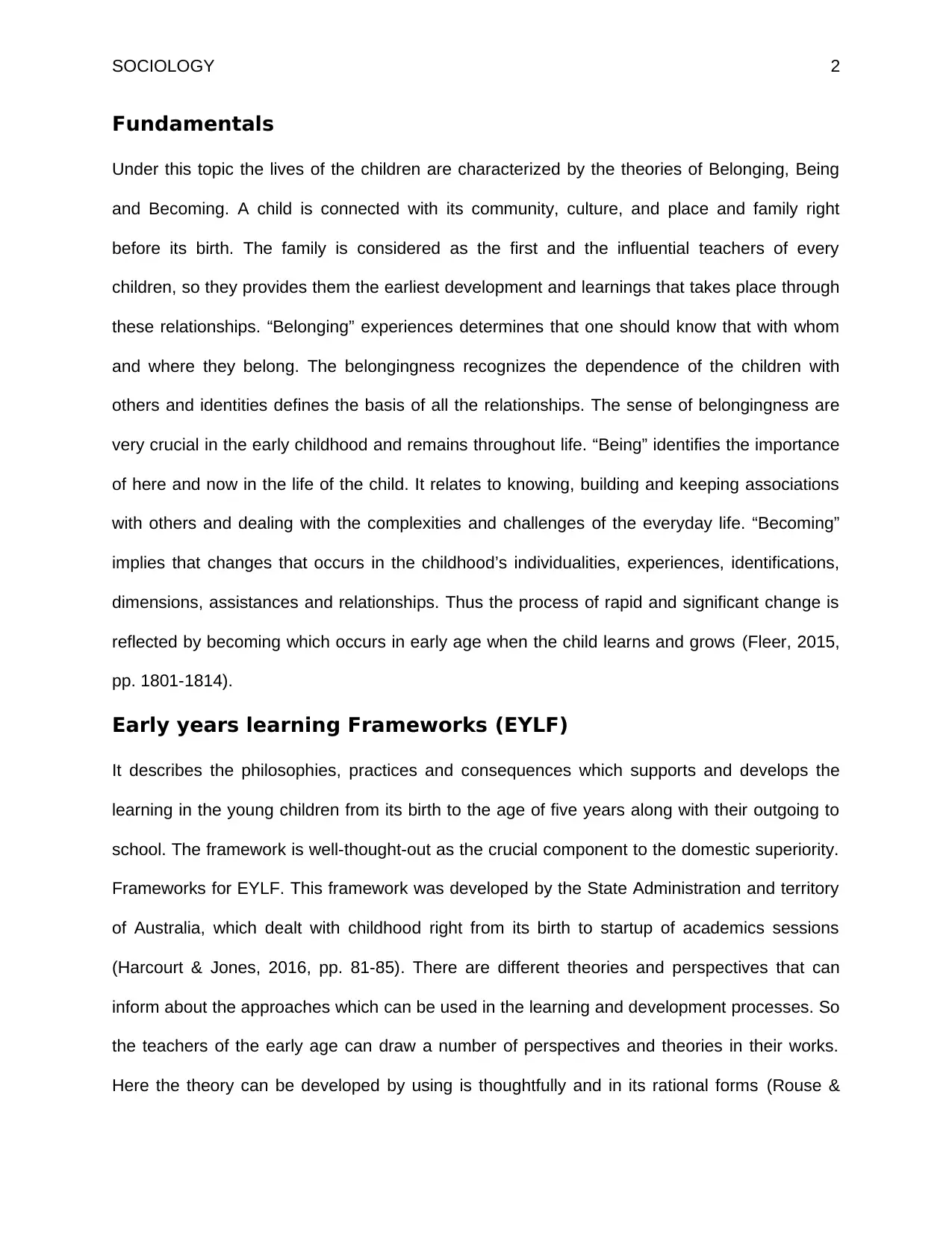
SOCIOLOGY 2
Fundamentals
Under this topic the lives of the children are characterized by the theories of Belonging, Being
and Becoming. A child is connected with its community, culture, and place and family right
before its birth. The family is considered as the first and the influential teachers of every
children, so they provides them the earliest development and learnings that takes place through
these relationships. “Belonging” experiences determines that one should know that with whom
and where they belong. The belongingness recognizes the dependence of the children with
others and identities defines the basis of all the relationships. The sense of belongingness are
very crucial in the early childhood and remains throughout life. “Being” identifies the importance
of here and now in the life of the child. It relates to knowing, building and keeping associations
with others and dealing with the complexities and challenges of the everyday life. “Becoming”
implies that changes that occurs in the childhood’s individualities, experiences, identifications,
dimensions, assistances and relationships. Thus the process of rapid and significant change is
reflected by becoming which occurs in early age when the child learns and grows (Fleer, 2015,
pp. 1801-1814).
Early years learning Frameworks (EYLF)
It describes the philosophies, practices and consequences which supports and develops the
learning in the young children from its birth to the age of five years along with their outgoing to
school. The framework is well-thought-out as the crucial component to the domestic superiority.
Frameworks for EYLF. This framework was developed by the State Administration and territory
of Australia, which dealt with childhood right from its birth to startup of academics sessions
(Harcourt & Jones, 2016, pp. 81-85). There are different theories and perspectives that can
inform about the approaches which can be used in the learning and development processes. So
the teachers of the early age can draw a number of perspectives and theories in their works.
Here the theory can be developed by using is thoughtfully and in its rational forms (Rouse &
Fundamentals
Under this topic the lives of the children are characterized by the theories of Belonging, Being
and Becoming. A child is connected with its community, culture, and place and family right
before its birth. The family is considered as the first and the influential teachers of every
children, so they provides them the earliest development and learnings that takes place through
these relationships. “Belonging” experiences determines that one should know that with whom
and where they belong. The belongingness recognizes the dependence of the children with
others and identities defines the basis of all the relationships. The sense of belongingness are
very crucial in the early childhood and remains throughout life. “Being” identifies the importance
of here and now in the life of the child. It relates to knowing, building and keeping associations
with others and dealing with the complexities and challenges of the everyday life. “Becoming”
implies that changes that occurs in the childhood’s individualities, experiences, identifications,
dimensions, assistances and relationships. Thus the process of rapid and significant change is
reflected by becoming which occurs in early age when the child learns and grows (Fleer, 2015,
pp. 1801-1814).
Early years learning Frameworks (EYLF)
It describes the philosophies, practices and consequences which supports and develops the
learning in the young children from its birth to the age of five years along with their outgoing to
school. The framework is well-thought-out as the crucial component to the domestic superiority.
Frameworks for EYLF. This framework was developed by the State Administration and territory
of Australia, which dealt with childhood right from its birth to startup of academics sessions
(Harcourt & Jones, 2016, pp. 81-85). There are different theories and perspectives that can
inform about the approaches which can be used in the learning and development processes. So
the teachers of the early age can draw a number of perspectives and theories in their works.
Here the theory can be developed by using is thoughtfully and in its rational forms (Rouse &
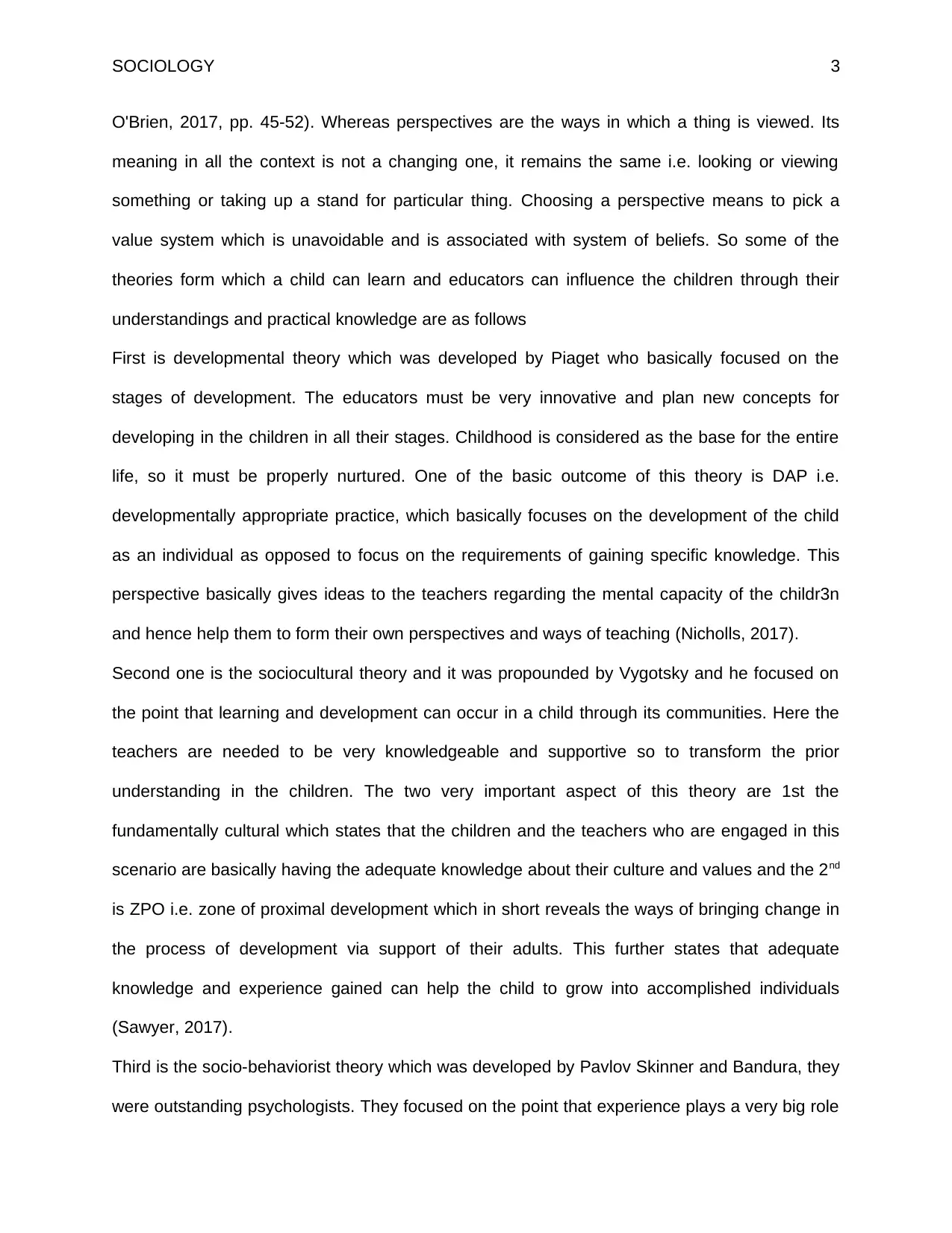
SOCIOLOGY 3
O'Brien, 2017, pp. 45-52). Whereas perspectives are the ways in which a thing is viewed. Its
meaning in all the context is not a changing one, it remains the same i.e. looking or viewing
something or taking up a stand for particular thing. Choosing a perspective means to pick a
value system which is unavoidable and is associated with system of beliefs. So some of the
theories form which a child can learn and educators can influence the children through their
understandings and practical knowledge are as follows
First is developmental theory which was developed by Piaget who basically focused on the
stages of development. The educators must be very innovative and plan new concepts for
developing in the children in all their stages. Childhood is considered as the base for the entire
life, so it must be properly nurtured. One of the basic outcome of this theory is DAP i.e.
developmentally appropriate practice, which basically focuses on the development of the child
as an individual as opposed to focus on the requirements of gaining specific knowledge. This
perspective basically gives ideas to the teachers regarding the mental capacity of the childr3n
and hence help them to form their own perspectives and ways of teaching (Nicholls, 2017).
Second one is the sociocultural theory and it was propounded by Vygotsky and he focused on
the point that learning and development can occur in a child through its communities. Here the
teachers are needed to be very knowledgeable and supportive so to transform the prior
understanding in the children. The two very important aspect of this theory are 1st the
fundamentally cultural which states that the children and the teachers who are engaged in this
scenario are basically having the adequate knowledge about their culture and values and the 2nd
is ZPO i.e. zone of proximal development which in short reveals the ways of bringing change in
the process of development via support of their adults. This further states that adequate
knowledge and experience gained can help the child to grow into accomplished individuals
(Sawyer, 2017).
Third is the socio-behaviorist theory which was developed by Pavlov Skinner and Bandura, they
were outstanding psychologists. They focused on the point that experience plays a very big role
O'Brien, 2017, pp. 45-52). Whereas perspectives are the ways in which a thing is viewed. Its
meaning in all the context is not a changing one, it remains the same i.e. looking or viewing
something or taking up a stand for particular thing. Choosing a perspective means to pick a
value system which is unavoidable and is associated with system of beliefs. So some of the
theories form which a child can learn and educators can influence the children through their
understandings and practical knowledge are as follows
First is developmental theory which was developed by Piaget who basically focused on the
stages of development. The educators must be very innovative and plan new concepts for
developing in the children in all their stages. Childhood is considered as the base for the entire
life, so it must be properly nurtured. One of the basic outcome of this theory is DAP i.e.
developmentally appropriate practice, which basically focuses on the development of the child
as an individual as opposed to focus on the requirements of gaining specific knowledge. This
perspective basically gives ideas to the teachers regarding the mental capacity of the childr3n
and hence help them to form their own perspectives and ways of teaching (Nicholls, 2017).
Second one is the sociocultural theory and it was propounded by Vygotsky and he focused on
the point that learning and development can occur in a child through its communities. Here the
teachers are needed to be very knowledgeable and supportive so to transform the prior
understanding in the children. The two very important aspect of this theory are 1st the
fundamentally cultural which states that the children and the teachers who are engaged in this
scenario are basically having the adequate knowledge about their culture and values and the 2nd
is ZPO i.e. zone of proximal development which in short reveals the ways of bringing change in
the process of development via support of their adults. This further states that adequate
knowledge and experience gained can help the child to grow into accomplished individuals
(Sawyer, 2017).
Third is the socio-behaviorist theory which was developed by Pavlov Skinner and Bandura, they
were outstanding psychologists. They focused on the point that experience plays a very big role
Secure Best Marks with AI Grader
Need help grading? Try our AI Grader for instant feedback on your assignments.
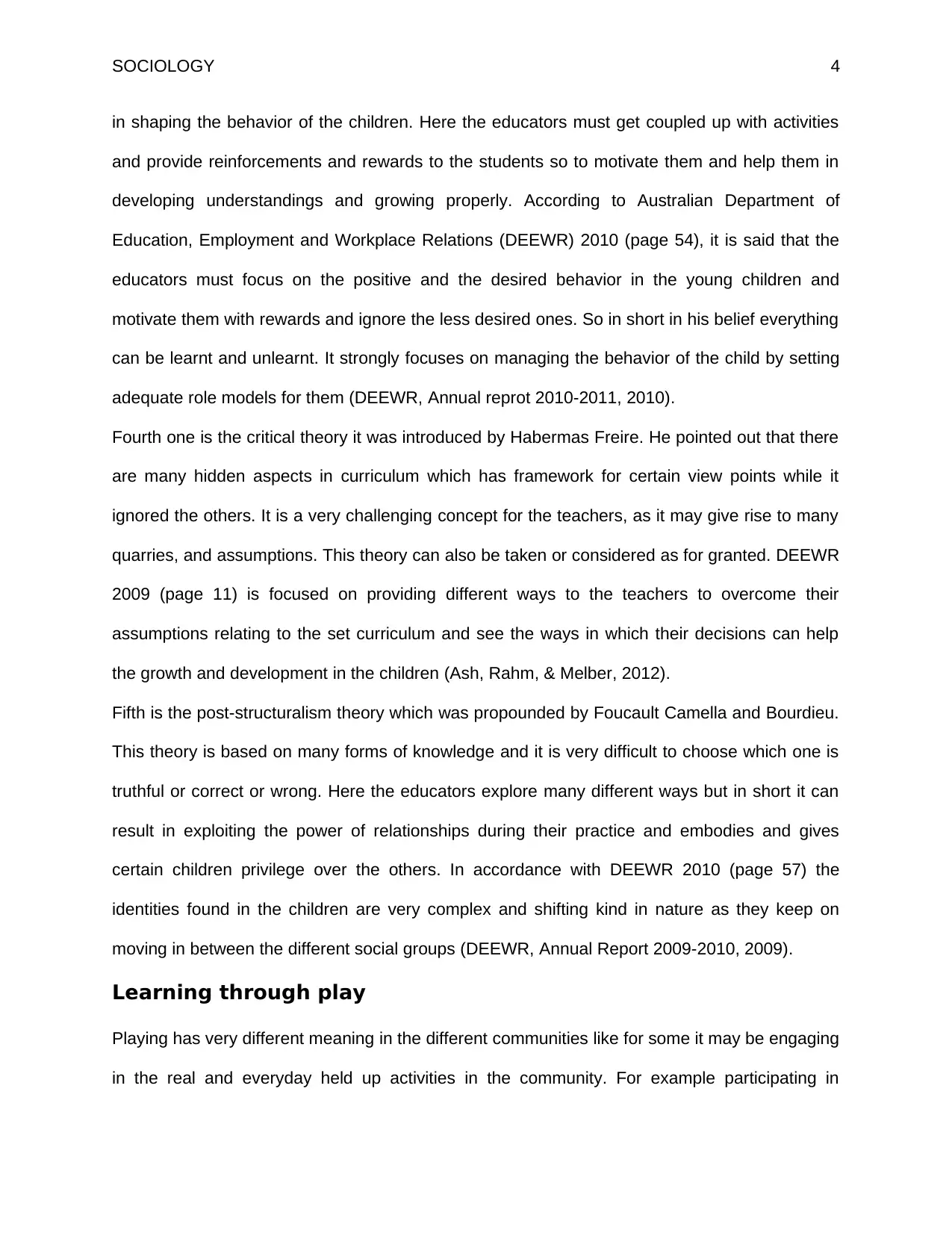
SOCIOLOGY 4
in shaping the behavior of the children. Here the educators must get coupled up with activities
and provide reinforcements and rewards to the students so to motivate them and help them in
developing understandings and growing properly. According to Australian Department of
Education, Employment and Workplace Relations (DEEWR) 2010 (page 54), it is said that the
educators must focus on the positive and the desired behavior in the young children and
motivate them with rewards and ignore the less desired ones. So in short in his belief everything
can be learnt and unlearnt. It strongly focuses on managing the behavior of the child by setting
adequate role models for them (DEEWR, Annual reprot 2010-2011, 2010).
Fourth one is the critical theory it was introduced by Habermas Freire. He pointed out that there
are many hidden aspects in curriculum which has framework for certain view points while it
ignored the others. It is a very challenging concept for the teachers, as it may give rise to many
quarries, and assumptions. This theory can also be taken or considered as for granted. DEEWR
2009 (page 11) is focused on providing different ways to the teachers to overcome their
assumptions relating to the set curriculum and see the ways in which their decisions can help
the growth and development in the children (Ash, Rahm, & Melber, 2012).
Fifth is the post-structuralism theory which was propounded by Foucault Camella and Bourdieu.
This theory is based on many forms of knowledge and it is very difficult to choose which one is
truthful or correct or wrong. Here the educators explore many different ways but in short it can
result in exploiting the power of relationships during their practice and embodies and gives
certain children privilege over the others. In accordance with DEEWR 2010 (page 57) the
identities found in the children are very complex and shifting kind in nature as they keep on
moving in between the different social groups (DEEWR, Annual Report 2009-2010, 2009).
Learning through play
Playing has very different meaning in the different communities like for some it may be engaging
in the real and everyday held up activities in the community. For example participating in
in shaping the behavior of the children. Here the educators must get coupled up with activities
and provide reinforcements and rewards to the students so to motivate them and help them in
developing understandings and growing properly. According to Australian Department of
Education, Employment and Workplace Relations (DEEWR) 2010 (page 54), it is said that the
educators must focus on the positive and the desired behavior in the young children and
motivate them with rewards and ignore the less desired ones. So in short in his belief everything
can be learnt and unlearnt. It strongly focuses on managing the behavior of the child by setting
adequate role models for them (DEEWR, Annual reprot 2010-2011, 2010).
Fourth one is the critical theory it was introduced by Habermas Freire. He pointed out that there
are many hidden aspects in curriculum which has framework for certain view points while it
ignored the others. It is a very challenging concept for the teachers, as it may give rise to many
quarries, and assumptions. This theory can also be taken or considered as for granted. DEEWR
2009 (page 11) is focused on providing different ways to the teachers to overcome their
assumptions relating to the set curriculum and see the ways in which their decisions can help
the growth and development in the children (Ash, Rahm, & Melber, 2012).
Fifth is the post-structuralism theory which was propounded by Foucault Camella and Bourdieu.
This theory is based on many forms of knowledge and it is very difficult to choose which one is
truthful or correct or wrong. Here the educators explore many different ways but in short it can
result in exploiting the power of relationships during their practice and embodies and gives
certain children privilege over the others. In accordance with DEEWR 2010 (page 57) the
identities found in the children are very complex and shifting kind in nature as they keep on
moving in between the different social groups (DEEWR, Annual Report 2009-2010, 2009).
Learning through play
Playing has very different meaning in the different communities like for some it may be engaging
in the real and everyday held up activities in the community. For example participating in
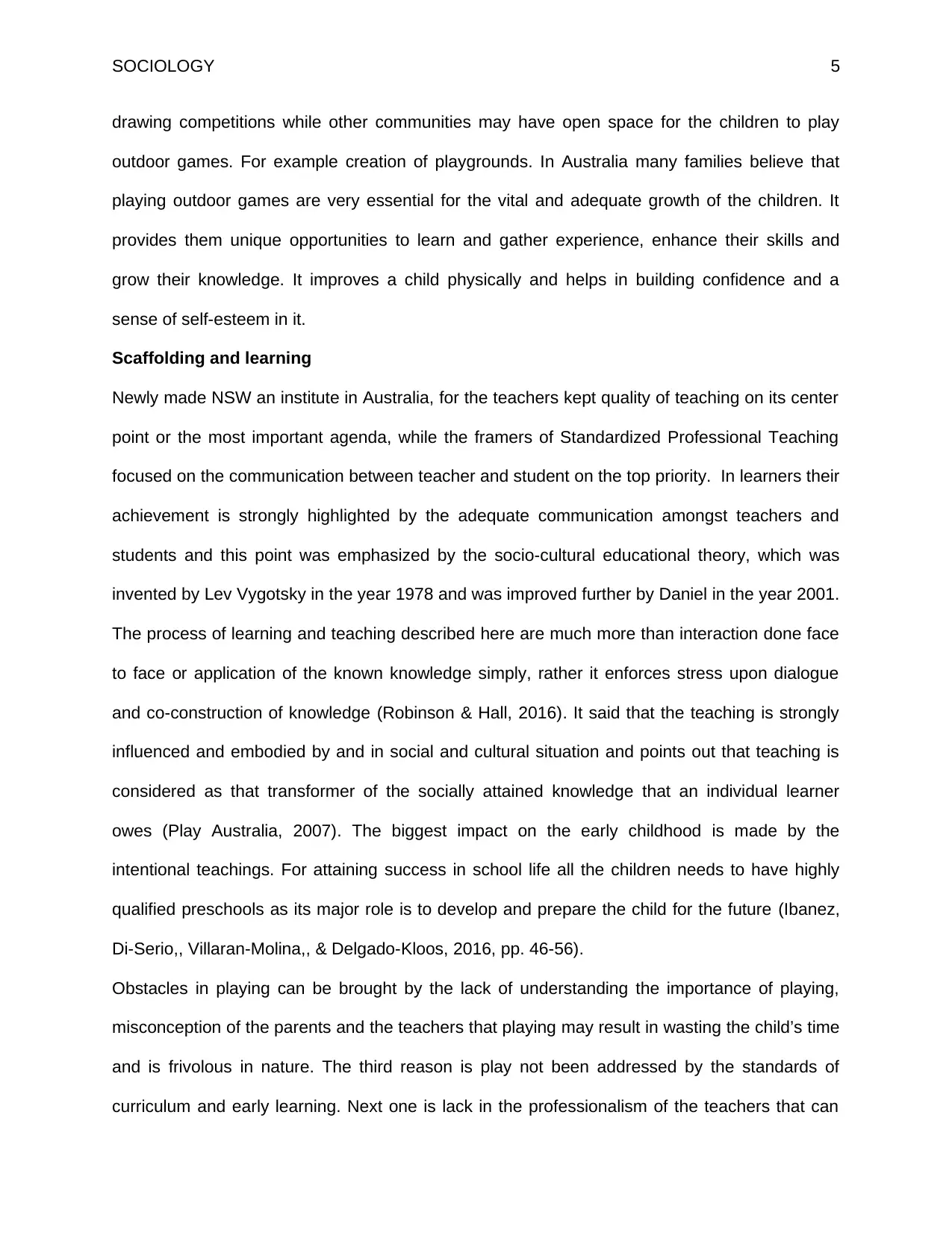
SOCIOLOGY 5
drawing competitions while other communities may have open space for the children to play
outdoor games. For example creation of playgrounds. In Australia many families believe that
playing outdoor games are very essential for the vital and adequate growth of the children. It
provides them unique opportunities to learn and gather experience, enhance their skills and
grow their knowledge. It improves a child physically and helps in building confidence and a
sense of self-esteem in it.
Scaffolding and learning
Newly made NSW an institute in Australia, for the teachers kept quality of teaching on its center
point or the most important agenda, while the framers of Standardized Professional Teaching
focused on the communication between teacher and student on the top priority. In learners their
achievement is strongly highlighted by the adequate communication amongst teachers and
students and this point was emphasized by the socio-cultural educational theory, which was
invented by Lev Vygotsky in the year 1978 and was improved further by Daniel in the year 2001.
The process of learning and teaching described here are much more than interaction done face
to face or application of the known knowledge simply, rather it enforces stress upon dialogue
and co-construction of knowledge (Robinson & Hall, 2016). It said that the teaching is strongly
influenced and embodied by and in social and cultural situation and points out that teaching is
considered as that transformer of the socially attained knowledge that an individual learner
owes (Play Australia, 2007). The biggest impact on the early childhood is made by the
intentional teachings. For attaining success in school life all the children needs to have highly
qualified preschools as its major role is to develop and prepare the child for the future (Ibanez,
Di-Serio,, Villaran-Molina,, & Delgado-Kloos, 2016, pp. 46-56).
Obstacles in playing can be brought by the lack of understanding the importance of playing,
misconception of the parents and the teachers that playing may result in wasting the child’s time
and is frivolous in nature. The third reason is play not been addressed by the standards of
curriculum and early learning. Next one is lack in the professionalism of the teachers that can
drawing competitions while other communities may have open space for the children to play
outdoor games. For example creation of playgrounds. In Australia many families believe that
playing outdoor games are very essential for the vital and adequate growth of the children. It
provides them unique opportunities to learn and gather experience, enhance their skills and
grow their knowledge. It improves a child physically and helps in building confidence and a
sense of self-esteem in it.
Scaffolding and learning
Newly made NSW an institute in Australia, for the teachers kept quality of teaching on its center
point or the most important agenda, while the framers of Standardized Professional Teaching
focused on the communication between teacher and student on the top priority. In learners their
achievement is strongly highlighted by the adequate communication amongst teachers and
students and this point was emphasized by the socio-cultural educational theory, which was
invented by Lev Vygotsky in the year 1978 and was improved further by Daniel in the year 2001.
The process of learning and teaching described here are much more than interaction done face
to face or application of the known knowledge simply, rather it enforces stress upon dialogue
and co-construction of knowledge (Robinson & Hall, 2016). It said that the teaching is strongly
influenced and embodied by and in social and cultural situation and points out that teaching is
considered as that transformer of the socially attained knowledge that an individual learner
owes (Play Australia, 2007). The biggest impact on the early childhood is made by the
intentional teachings. For attaining success in school life all the children needs to have highly
qualified preschools as its major role is to develop and prepare the child for the future (Ibanez,
Di-Serio,, Villaran-Molina,, & Delgado-Kloos, 2016, pp. 46-56).
Obstacles in playing can be brought by the lack of understanding the importance of playing,
misconception of the parents and the teachers that playing may result in wasting the child’s time
and is frivolous in nature. The third reason is play not been addressed by the standards of
curriculum and early learning. Next one is lack in the professionalism of the teachers that can
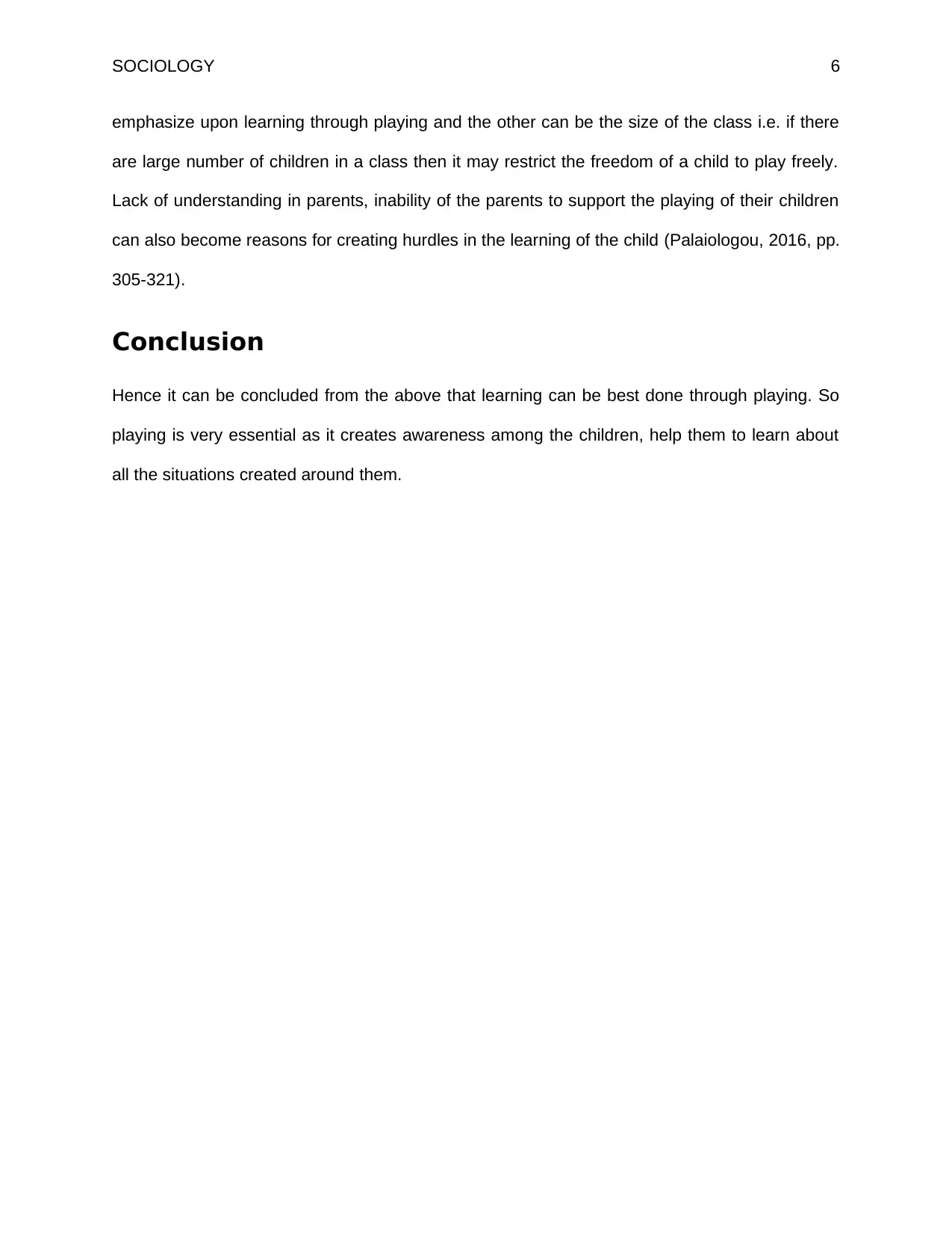
SOCIOLOGY 6
emphasize upon learning through playing and the other can be the size of the class i.e. if there
are large number of children in a class then it may restrict the freedom of a child to play freely.
Lack of understanding in parents, inability of the parents to support the playing of their children
can also become reasons for creating hurdles in the learning of the child (Palaiologou, 2016, pp.
305-321).
Conclusion
Hence it can be concluded from the above that learning can be best done through playing. So
playing is very essential as it creates awareness among the children, help them to learn about
all the situations created around them.
emphasize upon learning through playing and the other can be the size of the class i.e. if there
are large number of children in a class then it may restrict the freedom of a child to play freely.
Lack of understanding in parents, inability of the parents to support the playing of their children
can also become reasons for creating hurdles in the learning of the child (Palaiologou, 2016, pp.
305-321).
Conclusion
Hence it can be concluded from the above that learning can be best done through playing. So
playing is very essential as it creates awareness among the children, help them to learn about
all the situations created around them.
Paraphrase This Document
Need a fresh take? Get an instant paraphrase of this document with our AI Paraphraser
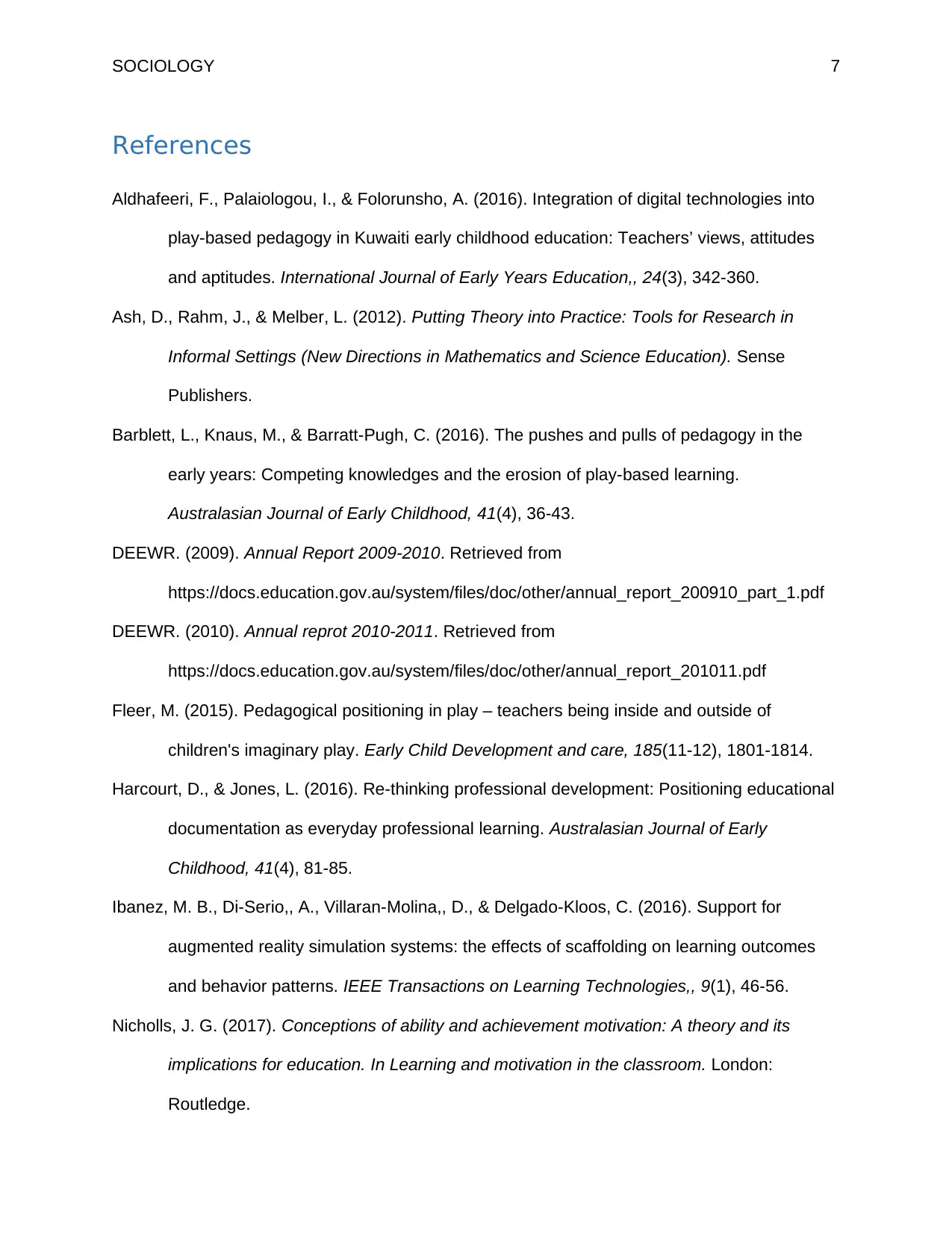
SOCIOLOGY 7
References
Aldhafeeri, F., Palaiologou, I., & Folorunsho, A. (2016). Integration of digital technologies into
play-based pedagogy in Kuwaiti early childhood education: Teachers’ views, attitudes
and aptitudes. International Journal of Early Years Education,, 24(3), 342-360.
Ash, D., Rahm, J., & Melber, L. (2012). Putting Theory into Practice: Tools for Research in
Informal Settings (New Directions in Mathematics and Science Education). Sense
Publishers.
Barblett, L., Knaus, M., & Barratt-Pugh, C. (2016). The pushes and pulls of pedagogy in the
early years: Competing knowledges and the erosion of play-based learning.
Australasian Journal of Early Childhood, 41(4), 36-43.
DEEWR. (2009). Annual Report 2009-2010. Retrieved from
https://docs.education.gov.au/system/files/doc/other/annual_report_200910_part_1.pdf
DEEWR. (2010). Annual reprot 2010-2011. Retrieved from
https://docs.education.gov.au/system/files/doc/other/annual_report_201011.pdf
Fleer, M. (2015). Pedagogical positioning in play – teachers being inside and outside of
children's imaginary play. Early Child Development and care, 185(11-12), 1801-1814.
Harcourt, D., & Jones, L. (2016). Re-thinking professional development: Positioning educational
documentation as everyday professional learning. Australasian Journal of Early
Childhood, 41(4), 81-85.
Ibanez, M. B., Di-Serio,, A., Villaran-Molina,, D., & Delgado-Kloos, C. (2016). Support for
augmented reality simulation systems: the effects of scaffolding on learning outcomes
and behavior patterns. IEEE Transactions on Learning Technologies,, 9(1), 46-56.
Nicholls, J. G. (2017). Conceptions of ability and achievement motivation: A theory and its
implications for education. In Learning and motivation in the classroom. London:
Routledge.
References
Aldhafeeri, F., Palaiologou, I., & Folorunsho, A. (2016). Integration of digital technologies into
play-based pedagogy in Kuwaiti early childhood education: Teachers’ views, attitudes
and aptitudes. International Journal of Early Years Education,, 24(3), 342-360.
Ash, D., Rahm, J., & Melber, L. (2012). Putting Theory into Practice: Tools for Research in
Informal Settings (New Directions in Mathematics and Science Education). Sense
Publishers.
Barblett, L., Knaus, M., & Barratt-Pugh, C. (2016). The pushes and pulls of pedagogy in the
early years: Competing knowledges and the erosion of play-based learning.
Australasian Journal of Early Childhood, 41(4), 36-43.
DEEWR. (2009). Annual Report 2009-2010. Retrieved from
https://docs.education.gov.au/system/files/doc/other/annual_report_200910_part_1.pdf
DEEWR. (2010). Annual reprot 2010-2011. Retrieved from
https://docs.education.gov.au/system/files/doc/other/annual_report_201011.pdf
Fleer, M. (2015). Pedagogical positioning in play – teachers being inside and outside of
children's imaginary play. Early Child Development and care, 185(11-12), 1801-1814.
Harcourt, D., & Jones, L. (2016). Re-thinking professional development: Positioning educational
documentation as everyday professional learning. Australasian Journal of Early
Childhood, 41(4), 81-85.
Ibanez, M. B., Di-Serio,, A., Villaran-Molina,, D., & Delgado-Kloos, C. (2016). Support for
augmented reality simulation systems: the effects of scaffolding on learning outcomes
and behavior patterns. IEEE Transactions on Learning Technologies,, 9(1), 46-56.
Nicholls, J. G. (2017). Conceptions of ability and achievement motivation: A theory and its
implications for education. In Learning and motivation in the classroom. London:
Routledge.
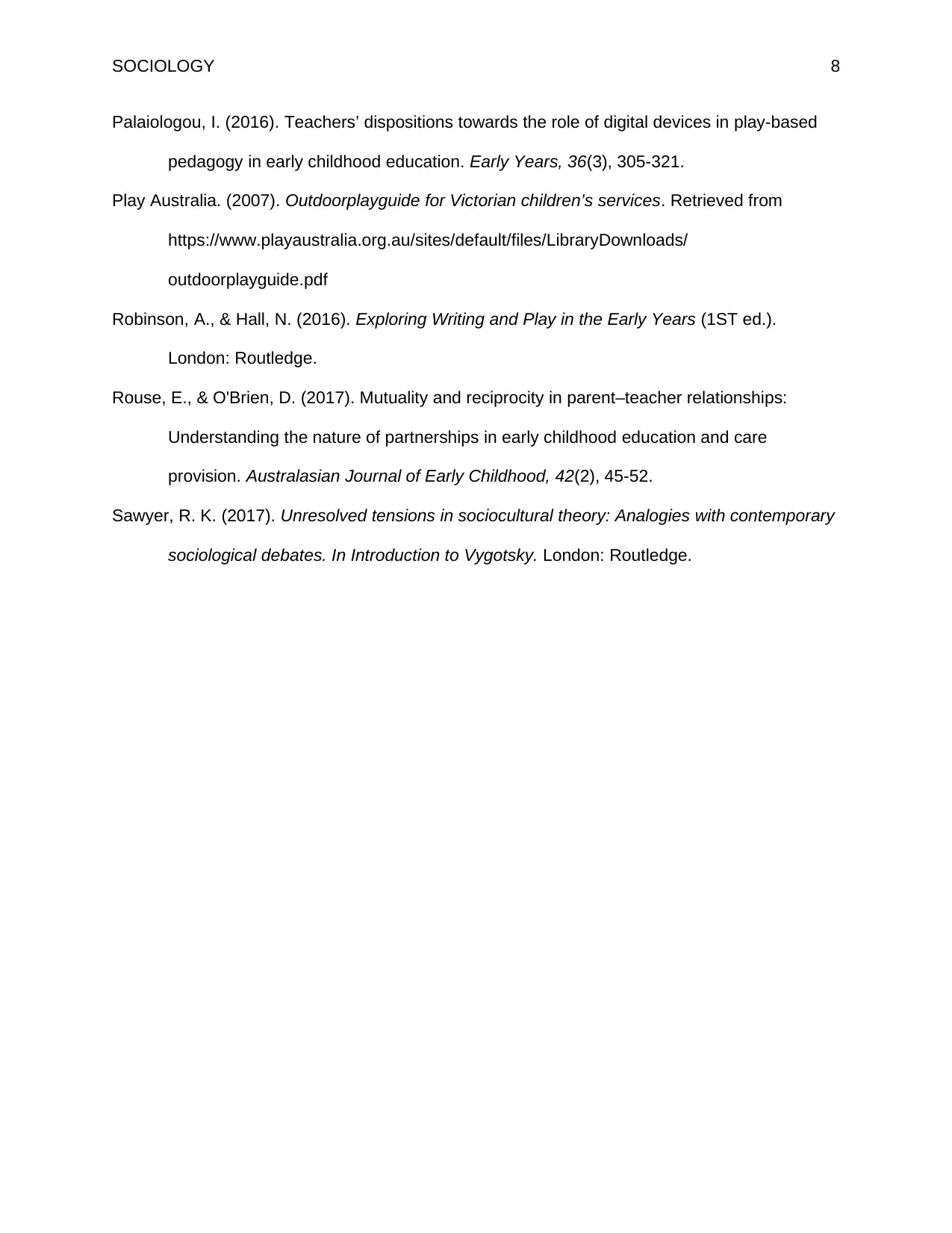
SOCIOLOGY 8
Palaiologou, I. (2016). Teachers’ dispositions towards the role of digital devices in play-based
pedagogy in early childhood education. Early Years, 36(3), 305-321.
Play Australia. (2007). Outdoorplayguide for Victorian children’s services. Retrieved from
https://www.playaustralia.org.au/sites/default/files/LibraryDownloads/
outdoorplayguide.pdf
Robinson, A., & Hall, N. (2016). Exploring Writing and Play in the Early Years (1ST ed.).
London: Routledge.
Rouse, E., & O'Brien, D. (2017). Mutuality and reciprocity in parent–teacher relationships:
Understanding the nature of partnerships in early childhood education and care
provision. Australasian Journal of Early Childhood, 42(2), 45-52.
Sawyer, R. K. (2017). Unresolved tensions in sociocultural theory: Analogies with contemporary
sociological debates. In Introduction to Vygotsky. London: Routledge.
Palaiologou, I. (2016). Teachers’ dispositions towards the role of digital devices in play-based
pedagogy in early childhood education. Early Years, 36(3), 305-321.
Play Australia. (2007). Outdoorplayguide for Victorian children’s services. Retrieved from
https://www.playaustralia.org.au/sites/default/files/LibraryDownloads/
outdoorplayguide.pdf
Robinson, A., & Hall, N. (2016). Exploring Writing and Play in the Early Years (1ST ed.).
London: Routledge.
Rouse, E., & O'Brien, D. (2017). Mutuality and reciprocity in parent–teacher relationships:
Understanding the nature of partnerships in early childhood education and care
provision. Australasian Journal of Early Childhood, 42(2), 45-52.
Sawyer, R. K. (2017). Unresolved tensions in sociocultural theory: Analogies with contemporary
sociological debates. In Introduction to Vygotsky. London: Routledge.
1 out of 9
Related Documents
Your All-in-One AI-Powered Toolkit for Academic Success.
+13062052269
info@desklib.com
Available 24*7 on WhatsApp / Email
![[object Object]](/_next/static/media/star-bottom.7253800d.svg)
Unlock your academic potential
© 2024 | Zucol Services PVT LTD | All rights reserved.




